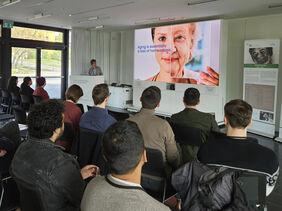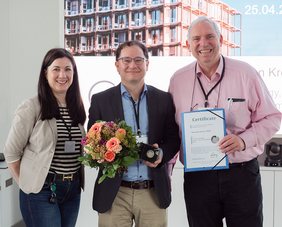Jena. Annually, the organizes the "Leibniz Conference on Bioactive Compounds". The conference provides an opportunity for exchange and also highlights a member of the Leibniz Association. This year, the Leibniz Institute on Aging - Fritz Lipmann Institute (FLI) in Jena hosted the meeting. On April 24 and 25, 70 scientists from around the world met to gather in the Thuringian research hub. Among the keynote speakers were from the Institute of Molecular Oncology in Milan and from Charité in Berlin. The conference traditionally fosters dialogue between disciplines as well as between science and industry.
In addition to professional exchange, award ceremonies were also on the agenda. The award "Leibniz Drug of the Year 2024" went this year to the team of Yvonne Mast from the for their findings in biotransformation-coupled mutasynthesis for the generation of novel pristinamycin derivatives. This year´s prize was awarded to Professor Krönke from the . He is one of the pioneers of PROTAC research, which is now experiencing an indescribable boom. In particular, he has played a leading role in clarifying the role of thalidomide and ubiquitin ligases and in blood cancer in general, which often cannot be targeted by the usual mitosis inhibitors. He is one of the few physicians with active drug research.
Moreover, young researchers had the opportunity to attract attention: as part of a competition, the best poster presentation (Selin Bulut, Aachen) and best young scientist´s talk (Sundar Hengoju, Jena) were awarded with a prize.










